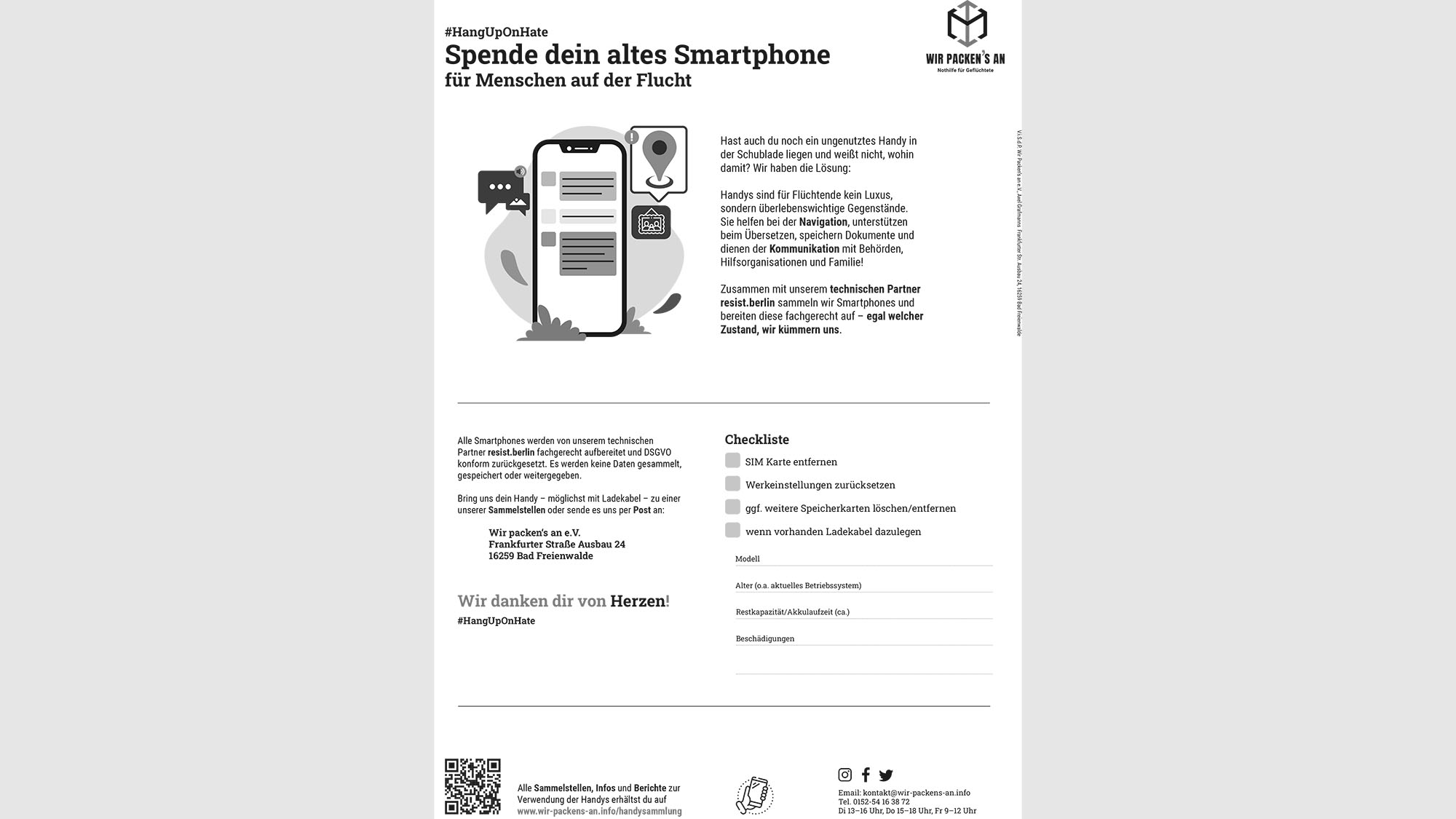Mobile phone contracts mean customers receive a new device every two years; while the new phone might have plenty of new functions, it will likely only be guaranteed to receive software updates for too short a time. Although most mobile phones could be used for longer, they end up in the box with old electronic waste after just a few years. But what no longer meets our expectations of modern technology is vital for other people. The “Wir packen’s an” (‘We’re tackling it’) association distributes discarded mobile phones to refugees fleeing their country.
Functioning smartphones are essential for people who have to leave their homes. They are an important means of orientation and enable communication with family members back home or people on other escape routes. Their cameras and microphones also fulfil an important protective function—precisely why they are often purposefully destroyed on escape routes.
Destroying phones at borders is a “completely normal tactic”
People fleeing their own country embark on an indefinite and dangerous journey. Smugglers who enable them to flee usually only accompany them for a short time. They then have to find their own way of reaching countries that will grant them safety and asylum. A functioning smartphone is an important companion.
Read more: Fleeing with, and against your smartphone
Although the use of smartphones along refugee routes is essential, it is not always safe. A compelling dossier by Bread for the World shows how state actors spy on the personal data of refugees in the process of fleeing in order to organise pushbacks or prevent structures that support them.
With a phone as their smart companion, people on the run can recognise their current location, communicate with relatives and friends and, in the worst case, also record crimes and offences. This is because officers often commit bodily harm at border crossings or push back fleeing people via illegal pushbacks. Using a smartphone, fugitives can at least record evidence to report border officials at a later date. However, Daniel Looser from “Wir packen’s an” describes it as a “completely normal tactic” for mobile phones to be confiscated along with other items during border controls. Charging sockets are also regularly destroyed, rendering phones unusable a short time later.
This is intended to prevent people from escaping or human rights violations from being documented. When distributing the donated devices, “Wir packen’s an” therefore focuses on people who are still on the direct escape route, says Looser. In operational areas on the EU’s external borders, the organisation is also guided by feedback from its partner organisations. This tells them where the devices are currently most urgently needed. To ensure that the devices can actually be used, the organisation also donates €100 per month for SIM cards and chargers under the motto #HangUpOnHate. Anyone who has an old smartphone at home can donate.
Outside of Germany, other schemes are hard at work giving old smartphones a new life in the hands of refugees. “Phones Without Borders” operates similarly to “Wir packen’s an” from Switzerland, while “Solidaritech” is a UK company that donates not only phones but also computers and tablets to refugees who are starting again in a new country.
How can I donate my old mobile phone?
Interested parties can hand in discarded mobile phones either by post or in person at collection points. The phones can be handed in anonymously, without revealing any information about the donor or device specifications. However, the minimum requirement is that the devices must be compatible with Facebook, WhatsApp and the open-source map app “Organic Maps”. In May 2024, this restricts the operating system versions to Android 4 and iOS 12.0. Donors can check which operating system version a smartphone uses in their phone’s settings.
Before donating, donors need to reset the device and delete existing usage data. According to the information material from “Wir packen’s an”, it is particularly important to deregister Apple devices from iCloud, otherwise they cannot be reused. Apple itself explains exactly how this works in official instructions.
After phones have been handed in, the “resist.berlin” group carry out a further technical inspection. They also erase phones’ data to ensure the donors’ anonymity and data protection. A contact person from “resist.berlin” told RESET that defective devices are given to the collection point at MediaMarkt-Saturn stores for disposal. They then send them for recycling together with other e-waste.
The initiative relies on participation
Even if not all smartphones handed in are suitable for further use, “Wir packen’s an” still needs support. The initiative’s website offers free posters to download and ready-made social media content to share on Instagram. “Wir packen’s an” is also currently trying to set up a collection point in West Berlin. Anyone wanting to participate in the campaign can find all further information on the “Wir packen’s an” homepage.
Giving old electronics a new lease of life through donations is also the aim of the “Hey, Alter” (Hey, dude) initiative. Here, people can hand in old computers, which are then distributed to children and young people for educational purposes.
If you would like to find out more about what can be done with old smartphones, you can find a detailed overview article here on RESET via the link.
The post Donate Phones and Save Lives: “Wir Packen’s An” Collects Old Smartphones for Refugees appeared first on Digital for Good | RESET.ORG.


